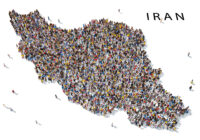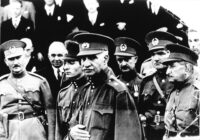Mohammad Reza Pahlavi ruled Iran as the Shah from 1941 to 1979. While his regime had Western support, it was not democratic. The Pahlavi regime’s authoritarian behavior led to the alienation of many Iranians and resulted in the 1979 Revolution of 1979 and its takeover by Ayatollah Ruhollah Khomeini, a Shia religious leader living in exile in Paris at the time. After the revolution, many of the Shah’s wealthy supporters emigrated to California and formed an influential community on the West Coast of the United States.
For years, followers of Reza Pahlavi, the Shah’s son and the former Iranian crown prince, have advocated for a transition from an Islamofascist dictatorship to a monarchy for Iran, almost similar to what happened in Spain. They compare Pahlavi to Juan Carlos, who ascended the throne and abolished the dictatorship with the support of Franco’s military.
Pahlavi followers claim he can achieve the same with the support of the Islamic Revolutionary Guards Corps (IRGC). Pahlavi himself has stated many times that he is in touch with the Iranian regime and has been open to IRGC overtures.
Spain’s transition from the dictatorship of Francisco Franco to a constitutional monarchy under King Juan Carlos I was a pivotal moment in Spanish history. Franco ruled Spain as a right-wing military dictator following his overthrow of the left-wing republic in the Spanish Civil War (1936–1939). Ultranationalism, authoritarianism and repression and persecution of political opposition characterized his regime. Before his death in 1975, Franco designated the exiled Prince Juan Carlos de Borbón as his successor, hoping that he would perpetuate the ultranationalist regime.
Contrasting Iran and Spain’s political landscapes
Juan Carlos dismantled the authoritarian regime and moved Spain towards democracy instead of following in Franco’s footsteps. The first step was the Political Reform Act of 1976, which allowed for the dismantling of Francoist institutions and paved the way for democratic elections. In 1977, the legalization of political parties led to the first free elections since the 1930s. Subsequently, a new democratic constitution was drafted and approved by a popular referendum in 1978, establishing Spain as a democratic parliamentary monarchy and guaranteeing fundamental rights and freedoms for all citizens.
However, Iran today is far from Spain, and there are fundamental differences between the two countries. The most significant is that the IRGC is not a regular military like Spain’s army was towards the end of Franco’s rule. The Guards are more akin to the SS in Nazi Germany and the Red Army in the Soviet Union, created with the specific purpose of enforcing the ideological agenda of their totalitarian regime. This makes them dependent on the regime’s core belief system, values and interests to stay relevant.
Even today, the Islamist regime’s warmongering across the Middle East and crimes against humanity in Iran and around the world deeply involve the IRGC, a US- and Canadian-designated “state terrorist organization” that is also likely to be designated by the EU. It is bent on the defeat of the United States, the destruction of Israel and the conquest of the Arab world. As such, the IRGC cannot possibly provide the building block for a democracy or even a normal regime in Iran.
The general behavior of Pahlavi’s Iranian supporters has not proved promising for democracy, either. His associates and followers have started a regime of oppression in exile even before getting to power in Iran. They have assaulted non-Pahlavist protesters during anti-regime demonstrations abroad, ran campaigns of harassment and intimidation against journalists and democracy activists, pushed IRGC talking points about political prisoners and Iran’s ethnic minorities and welcomed all kinds of nefarious regime affiliates, including antisemitic IRGC members, among their ranks.
The reality of Iran’s political transition
To cap it all, Pahlavi himself recently rejected democracy and instead suggested that he roots for some kind of an authoritarian regime. By erroneously comparing Iran to Afghanistan and putting forward a fallacious essentialist argument, Pahlavi claimed that Iran’s society, like Afghanistan, has its own “traditions, norms and means of governance” and imposing an “inauthentic Western construct” like “democracy” on it will lead to anarchy similar to Afghanistan. While the West and most of the free world widely praised the recent nationwide “Woman, Life, Freedom Revolution” in Iran for its progressive values, Pahlavi boldly made that argument to the contrary.
Pahlavi’s willingness to blatantly distort the truth about Iran and what most Iranians want explains why he and his supporters were disturbed by the Woman, Life, Freedom Revolution in the first place. Not only did they not fully support it, but they also took issue with many aspects of it because the progressive nature of that revolution nullified the Pahlavist narrative regarding the “backwardness” of Iranian society to legitimize an authoritarian regime, most likely in the form of an absolutist monarchy with Reza Pahlavi as its Shah.
Unlike Spain, Iran would not transition from fascism to democracy even if they put the prince on the throne and allowed the IRGC to continue to exist. The Guards are unlikely to relinquish power and become a regular army subordinated to a constitutional system. Instead, they would exploit their newfound legitimacy as Pahlavi’s praetorians to continue their campaign of terror in Iran and abroad.
Pahlavi himself would serve as a figurehead to legitimize the existence of the new fascist order. His advocacy for what inherently goes against American values, his dynasty’s historical hostility to democracy and his followers’ reactionary rhetoric and anti-democratic bent will further empower the Guards and their Russian allies to prevent Iran from shifting towards the West once the current Islamofascist regime falls.
As we have seen in the past decade, Moscow has learned that promoting far-right positions and politicians worldwide helps keep the world divided. At the same time, it continues to push for conquest and global domination. Iran is already within the Russian sphere of influence. Still, if the Islamist regime were to fall, the Kremlin would prefer to have an ultranationalist junta run the country rather than a Western-friendly liberal democracy. In other words, the Russians don’t want to see Iran as a powerful pillar of Western security strategy like the post-WWII Germany and Japan.
As things stand, Iran risks passing from one totalitarian regime to another. If things unfold in that direction, the country will remain a hotbed of tyranny and radicalism, oppressing its people while continuing to threaten its neighbors and the wider world. The democratic world needs to intervene to help the Iranian people establish a liberal democracy and bring Iran back to the West.
[Liam Roman edited this piece.]
The views expressed in this article are the author’s own and do not necessarily reflect Fair Observer’s editorial policy.
Support Fair Observer
We rely on your support for our independence, diversity and quality.
For more than 10 years, Fair Observer has been free, fair and independent. No billionaire owns us, no advertisers control us. We are a reader-supported nonprofit. Unlike many other publications, we keep our content free for readers regardless of where they live or whether they can afford to pay. We have no paywalls and no ads.
In the post-truth era of fake news, echo chambers and filter bubbles, we publish a plurality of perspectives from around the world. Anyone can publish with us, but everyone goes through a rigorous editorial process. So, you get fact-checked, well-reasoned content instead of noise.
We publish 2,500+ voices from 90+ countries. We also conduct education and training programs
on subjects ranging from digital media and journalism to writing and critical thinking. This
doesn’t come cheap. Servers, editors, trainers and web developers cost
money.
Please consider supporting us on a regular basis as a recurring donor or a
sustaining member.
Will you support FO’s journalism?
We rely on your support for our independence, diversity and quality.







Comment